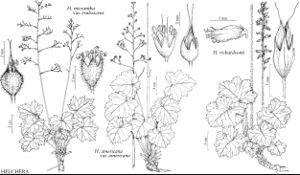Difference between revisions of "Heuchera micrantha"
Edwards’s Bot. Reg. 15: plate 1302. 1830 ,.
FNA>Volume Importer |
RevisionBot (talk | contribs) m (Bot: Adding category Revised Since Print) |
||
| (5 intermediate revisions by 3 users not shown) | |||
| Line 7: | Line 7: | ||
}} | }} | ||
|common_names=Crevice alum-root | |common_names=Crevice alum-root | ||
| + | |special_status={{Treatment/ID/Special_status | ||
| + | |code=F | ||
| + | |label=Illustrated | ||
| + | }}{{Treatment/ID/Special_status | ||
| + | |code=E | ||
| + | |label=Endemic | ||
| + | }} | ||
|basionyms= | |basionyms= | ||
|synonyms= | |synonyms= | ||
| Line 19: | Line 26: | ||
-->{{Treatment/Body | -->{{Treatment/Body | ||
| − | |distribution= | + | |distribution=B.C.;Calif.;Idaho;Oreg.;Wash. |
|discussion=<p>Varieties 5 (5 in the flora).</p><!-- | |discussion=<p>Varieties 5 (5 in the flora).</p><!-- | ||
--><p>The Skagit Indians rubbed pounded plants of <i>Heuchera micrantha</i> on hair to make it grow and applied it to cuts. The Thompson Indians used a mashed poultice of this root mixed with Douglas fir pitch for wounds. Chewed leaves and roots were spat on sores or wounds. Infusions of roots were taken for liver trouble and sore throat. Small, peeled, cleaned root pieces were chewed for mouth sores and gum boils (D. E. Moerman 1998).</p> | --><p>The Skagit Indians rubbed pounded plants of <i>Heuchera micrantha</i> on hair to make it grow and applied it to cuts. The Thompson Indians used a mashed poultice of this root mixed with Douglas fir pitch for wounds. Chewed leaves and roots were spat on sores or wounds. Infusions of roots were taken for liver trouble and sore throat. Small, peeled, cleaned root pieces were chewed for mouth sores and gum boils (D. E. Moerman 1998).</p> | ||
| Line 68: | Line 75: | ||
-->{{#Taxon: | -->{{#Taxon: | ||
name=Heuchera micrantha | name=Heuchera micrantha | ||
| − | |||
|authority=Douglas ex Lindley | |authority=Douglas ex Lindley | ||
|rank=species | |rank=species | ||
| Line 76: | Line 82: | ||
|family=Saxifragaceae | |family=Saxifragaceae | ||
|illustrator=Bee F. Gunn | |illustrator=Bee F. Gunn | ||
| − | | | + | |illustration copyright=Flora of North America Association |
| + | |distribution=B.C.;Calif.;Idaho;Oreg.;Wash. | ||
|reference=None | |reference=None | ||
|publication title=Edwards’s Bot. Reg. | |publication title=Edwards’s Bot. Reg. | ||
|publication year= | |publication year= | ||
| − | |special status= | + | |special status=Illustrated;Endemic |
| − | |source xml=https:// | + | |source xml=https://bitbucket.org/aafc-mbb/fna-data-curation/src/2e0870ddd59836b60bcf96646a41e87ea5a5943a/coarse_grained_fna_xml/V8/V8_171.xml |
|genus=Heuchera | |genus=Heuchera | ||
|species=Heuchera micrantha | |species=Heuchera micrantha | ||
}}<!-- | }}<!-- | ||
| − | -->[[Category:Treatment]][[Category:Heuchera]] | + | --> |
| + | |||
| + | [[Category:Treatment]] | ||
| + | [[Category:Heuchera]] | ||
| + | [[Category:Revised Since Print]] | ||
Latest revision as of 17:17, 6 November 2020
Herbs caulescent; caudex branched. Flowering stems 6–57 cm, short to long stipitate-glandular or glabrous, viscid. Leaves: petiole glabrous or sparsely to densely short to long stipitate-glandular; blade orbiculate to polygonal, shallowly to deeply 5–7(–9)-lobed, 2.5–10 cm, base cordate, lobes rounded, margins dentate, apex rounded or obtuse, surfaces glabrous or short to long stipitate-glandular, viscid. Inflorescences diffuse. Flowers: hypanthium radially symmetric, free to 1.5 mm, greenish white, often tinged with red, obconic to hemispheric, broadly turbinate, or campanulate, 1–4.9 mm, long stipitate-glandular, sometimes short stipitate-glandular proximally; sepals spreading to nearly erect, green- or red-tipped, equal, 0.5–1.8 mm, apex rounded to acute or mucronate; petals often coiled, white or pale pink, oblanceolate, (narrowly clawed), unlobed, 1.6–3.3 mm (2–3 times as long as sepals), margins entire; stamens exserted to 3 mm; styles exserted to 2.5 mm, 0.2–4.2 mm, to 0.1 mm diam. Capsules ovoid, 3–8.5 mm, beaks divergent, not papillose. Seeds black, broadly ellipsoid, (not curved), 0.5–0.8 mm.
Distribution

B.C., Calif., Idaho, Oreg., Wash.
Discussion
Varieties 5 (5 in the flora).
The Skagit Indians rubbed pounded plants of Heuchera micrantha on hair to make it grow and applied it to cuts. The Thompson Indians used a mashed poultice of this root mixed with Douglas fir pitch for wounds. Chewed leaves and roots were spat on sores or wounds. Infusions of roots were taken for liver trouble and sore throat. Small, peeled, cleaned root pieces were chewed for mouth sores and gum boils (D. E. Moerman 1998).
Selected References
None.
Lower Taxa
Key
| 1 | Leaf blades orbiculate to pentagonal, shallowly lobed. | Heuchera micrantha var. micrantha |
| 1 | Leaf blades pentagonal or heptagonal, deeply lobed | > 2 |
| 2 | Inflorescences short stipitate-glandular; petioles short stipitate-glandular or sparsely long stipitate-glandular | > 3 |
| 2 | Inflorescences long stipitate-glandular; petioles short to long stipitate-glandular | > 4 |
| 3 | Hypanthia hemispheric, 1 times long as wide; petals 0.4-1.4 mm wide. | Heuchera micrantha var. macropetala |
| 3 | Hypanthia obconic, 1.4 times longer than wide; petals 0.2-0.6 mm wide. | Heuchera micrantha var. erubescens |
| 4 | Hypanthia long stipitate-glandular, sepal apex rounded to acute. | Heuchera micrantha var. hartwegii |
| 4 | Hypanthia sparsely long stipitate-glandular, sepal apex acute to mucronate | Heuchera micrantha var. diversifolia |
